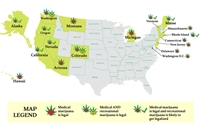
Oregon's Measure 80 is an interesting case. While it was reported as losing 45-55, the pro total actually crept up to 46.3% when all the returns were finally counted. This was with virtually no funding, though perhaps benefiting from discussion of the issue in neighboring Washington, and with language that was far more radical in most respects than either Washington's or Colorado's measures. With a better-written initiative and the funding that would likely attract, and with legalization happening next door as Dickinson pointed out, Oregon could be a winner soon -- if not 2014 and the expected more conservative turnout expected in an off year election, then in 2016.
Also interesting about Oregon, is that I thought the loss there while two other states passed would settle the debate over how to write an initiative -- whether to poll and do focus groups and write one that the research says can pass, or to just go for broke with the language you like -- the two initiatives that did the former won, the one that did the latter lost. But given how well Measure 80 did despite having no funding has some activists including a number of friends of mine saying that we don't have to compromise, or compromise as much, in order to win. If the funds come on board, the money and the real campaign it would enable could make up those 3.7 percentage points, is the reasoning.
I don't believe the money would make up those percentage points. I believe it is more likely that there is a swath of voters who agree with legalization in principle, but are picky about what kind of initiative they would approve, and that initiatives written the right way for them (or for the opinion leaders they take seriously like the former law enforcement and others who supported Washington's I-502) probably swung a significant percentage of voters. I think that Oregon was a special case, because of what was happening at the same time in Washington. And I think that a real campaign in Oregon, would have resulted in a greater amount of discussion about the details of the Oregon initiative (especially if polls suggested it had a chance), increasing the negative impact that certain aspects of it would have had on the aforementioned picky legalization supporters.
But do I know that for sure? No. Oregon's vote should certainly be studied to see what can be learned. So should Colorado's, a system that is pretty different from and a lot more open than Washington's. (At a Cato forum last week, former DEA chief Asa Hutchinson scarcely even mentioned Washington.)
One way or another, it is very likely that a page of history turned last month. Whether as many as seven states will go for legalization in the next few years, or whether Rolling Stone has called all the right ones, only time can tell. But the optimism is certainly appropriate -- time is on the side of marijuana legalization, and I hope for overall drug reform as well.
This work by StoptheDrugWar.org is licensed under Creative Commons Attribution-ShareAlike 4.0 International
Add new comment